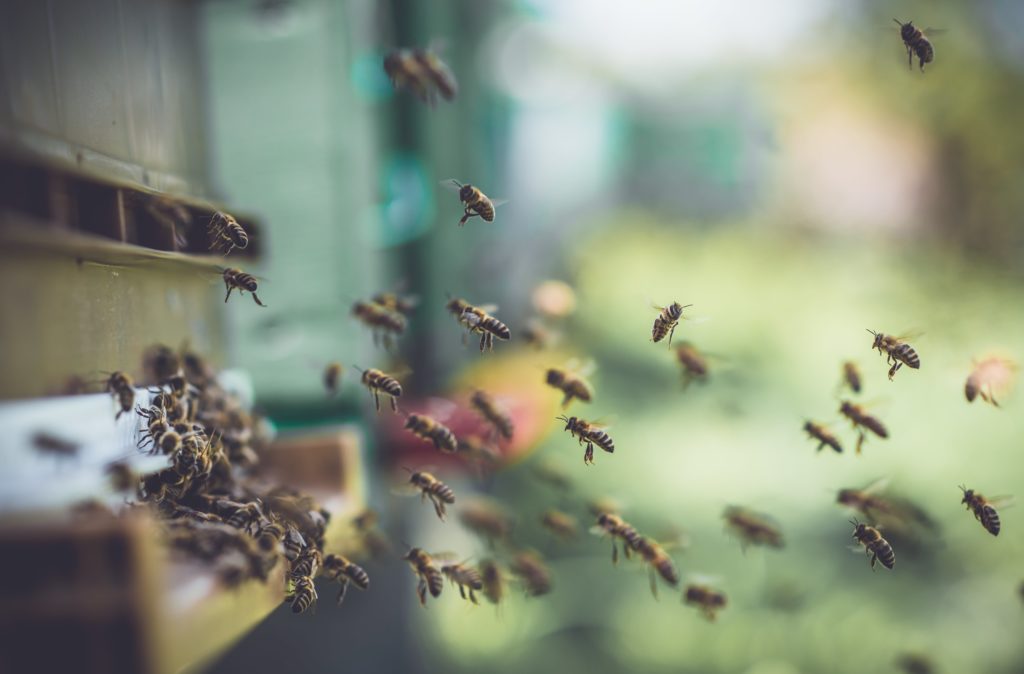
Bee-Friendly
Retailer Scorecard
Amid rising concern about an “insect apocalypse” and the decimation of the small but mighty pollinators responsible for one in three bites of food we eat, grocery retailers are beginning to step up to address the routine use of toxic pesticides in their supply chains.
And it’s not just pollinators: pesticides broadly threaten biodiversity above and belowground, undermining soil and ecosystem health. The same pesticides that threaten biodiversity have devastating impacts on human health, including farmworkers and rural communities on the frontlines of exposure. And pesticides contribute to climate change — they are made from fossil fuels and are energy-intensive to produce.
To spur a race to the top, Friends of the Earth created a retailer scorecard benchmarking 25 of the largest U.S. grocery stores on steps they are taking to address the use of toxic pesticides in their supply chains and to support the expansion of organic agriculture and other ecological solutions. Food retailers have significant economic power to change the food system.
Since 2018, 13 food retailers have created policies addressing pesticides. Yet action across the sector falls far short of what is needed to create a healthy, resilient food system.
| Retailer | Grade | Points | |
|---|---|---|---|
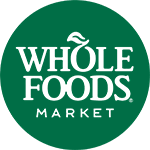 | Whole Foods | A | 133 |
 | Giant Eagle | B+ | 115 |
 | Walmart | B- | 94 |
 | Meijer | B- | 86.5 |
 | Costco | C | 70.5 |
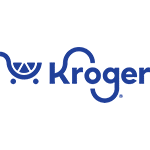 | Kroger | C | 70 |
 | CVS | D+ | 51.5 |
 | Aldi | D+ | 47.5 |
 | Dollar Tree | D | 43 |
 | Trader Joe’s | D | 42 |
 | Southeastern Grocers | D | 38 |
 | Rite Aid | D | 36 |
 | Ahold Dehaize | D- | 32.5 |
 | Albertsons | D- | 31 |
 | Target | D- | 28 |
 | Wegmans | F | 17 |
 | Amazon | F | 15 |
 | BJ’s | F | 9 |
 | H-E-B | F | 9 |
 | Walgreens | F | 5 |
 | Hy-Vee | F | 5 |
 | 7-Eleven Inc. | F | 0 |
 | Dollar General | F | 0 |
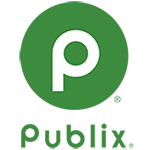 | Publix | F | 0 |
 | Wakefern | F | 0 |
Retailer action on pesticides falls short despite important momentum
Reducing pesticide use is a critical way for food companies to meet their goals around biodiversity, climate, health, and labor, and must become a key component of their environmental, social, and governance (ESG) programs.
Five companies — Giant Eagle, Walmart, Kroger, Whole Foods, and Meijer — have made time-bound commitments to address pesticide use in their supply chains by requiring fresh produce suppliers to adopt ecological farming methods known as Integrated Pest Management and to verify their practices through third-party certifications. Eight other companies — Albertsons, Aldi, Costco, CVS, Dollar Tree, Rite Aid, Southeastern Grocers, and Target — have created policies that encourage food and beverage suppliers to reduce use of pesticides of concern — including neonicotinoids, organophosphates and glyphosate — and to shift to least-toxic approaches, but the policies do not include metrics or targets for implementation. The majority of the company policies also state a commitment to expand organic offerings.
These are important first steps, but the extinction and climate crises demand more urgent action. We are calling on food retailers to:
- Support the expansion of organic farming in the U.S. and beyond as a leading form of regenerative agriculture which achieves soil health and biodiversity protection without the use of over 900 pesticides otherwise allowed in agriculture;
- Support non-organic growers to eliminate toxic pesticides by adopting robust Integrated Pest Management and other ecological practices that reduce the need for pesticides; and
- Make the reduction of pesticides and other agrochemicals a central pillar of all regenerative and climate-smart agriculture initiatives.
Pesticides pose an economic risk to grocery retailers
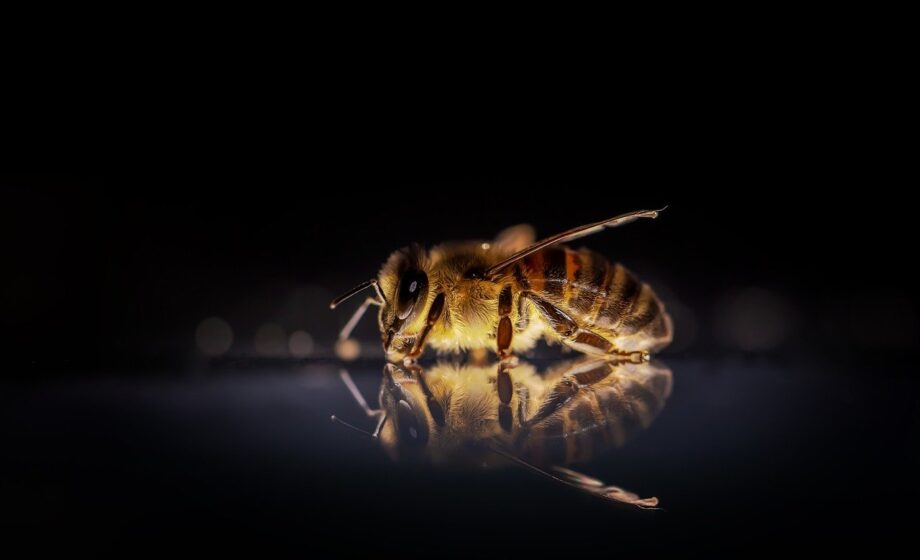
U.S. food retailers face $219 billion in financial, climate, and biodiversity risks from pesticides
The U.S. food retail sector’s use of pesticides on just four crops could result in $219 billion in financial risks between now and 2050. Read more in this report commissioned by Friends of the Earth and carried out by Netherlands-based research group Profundo.
How does your grocery store’s score compare to last year?
Scores by category
To highlight leaders and laggards, Friends of the Earth created a retailer scorecard benchmarking 25 of the largest U.S. grocers against four criteria: policies, implementation, transparency and collaboration. Additional points were awarded for companies with complimentary pesticide policies in their home & garden supply chains. (Note: Last updated December 2024).
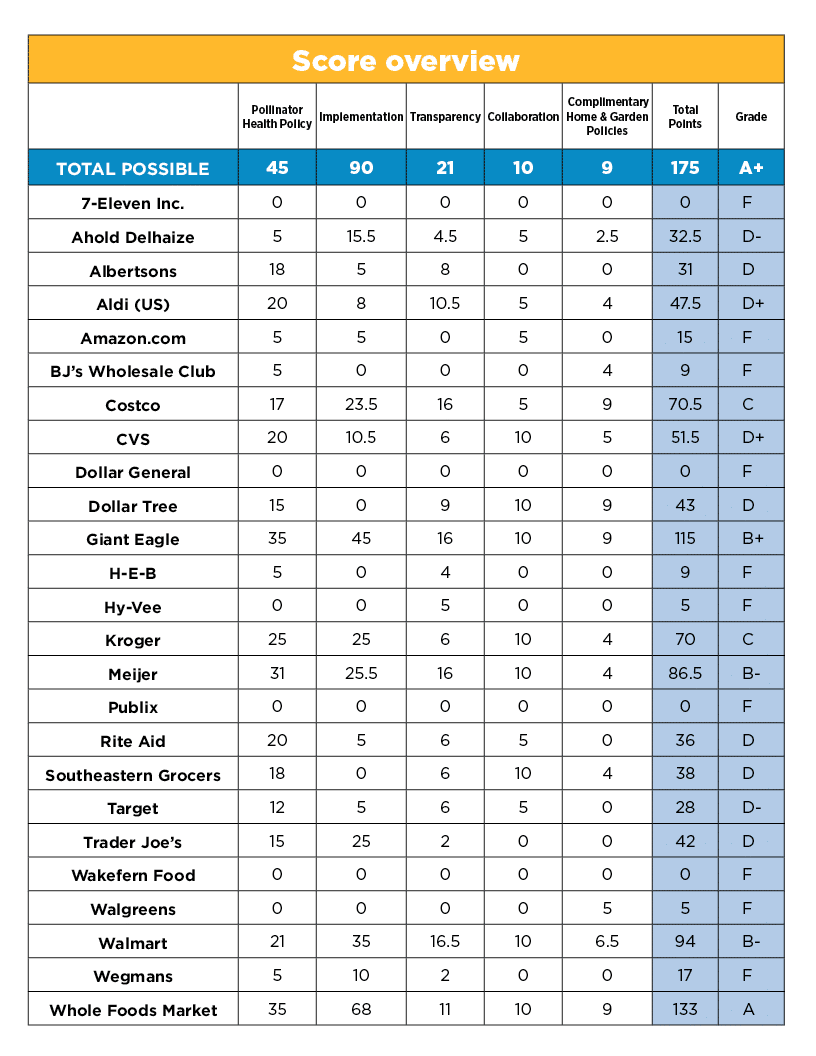
Methods
We looked at whether companies are setting goals to reduce use of pesticides of concern in their food and beverage supply chains, what they are doing to increase organic offerings and whether they are taking steps to support non-organic farmers to shift to least-toxic, bee-friendly approaches like integrated pest management and regenerative agriculture. We also looked at whether they are educating consumers about these issues and if they are using their power to advocate for public policies that shift government support from pesticide-intensive agriculture to organic and ecological farming systems. Additional points were awarded for complimentary policies in home and garden supply chains.
To see the grading rubric, click here.
Grades were assigned based on publicly available information concerning retailer policies and self-reported information concerning retailer practices. We reviewed publicly available information, including company websites, annual reports, SEC filings, corporate social responsibility and sustainability reports, press coverage and industry analyses.
We sent a provisional grade and scoresheet to each company by email and gave companies six months to respond with updates and corrections. The following companies were in contact with Friends of the Earth throughout the year: Ahold Delhaize, Amazon, Costco, CVS, Dollar Tree, Giant Eagle, Kroger, Meijer, Walmart, and Whole Foods.
*Although Amazon acquired Whole Foods in 2017, we graded these companies separately given that Whole Foods still maintains distinct policies and a substantially different business model. As of September, 2022, 511 of Amazons’ 571 brick-and-mortar grocery locations are Whole Foods stores. The remainder are Amazon Go and Amazon Fresh stores.
Tell Retailers To Save The Bees
Friends of the Earth, along with our millions of members and over 100 ally organizations representing beekeepers, farmers, farmworkers and environmentalists, will continue to push top grocery retailers to change their practices and will hold those accountable that fail to do so. Our ability to feed ourselves sustainably now and into the future depends on it. Join us!
